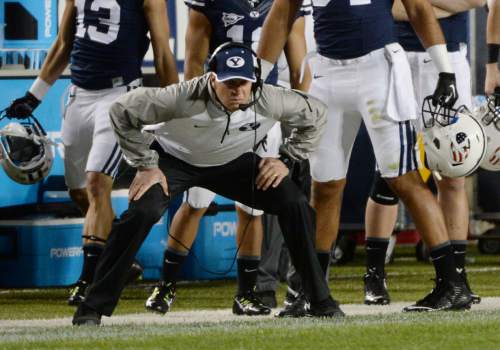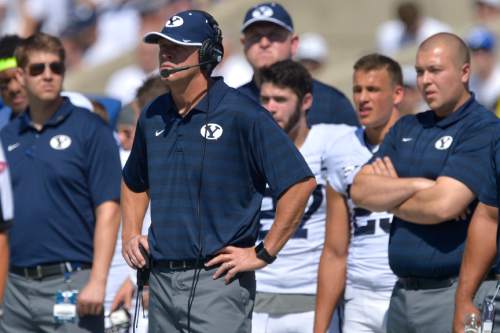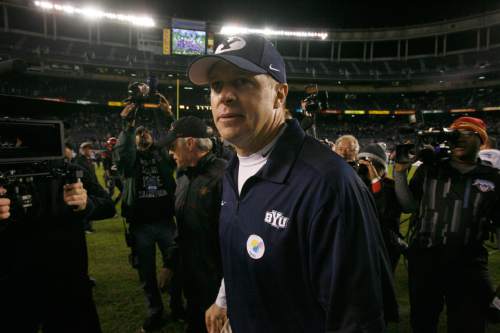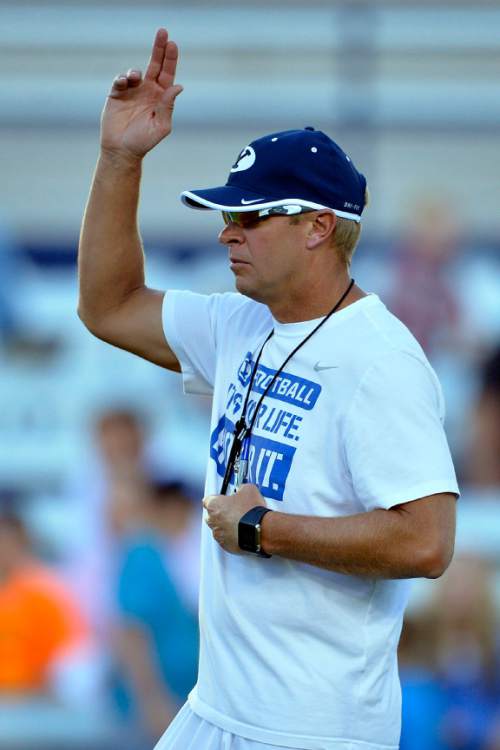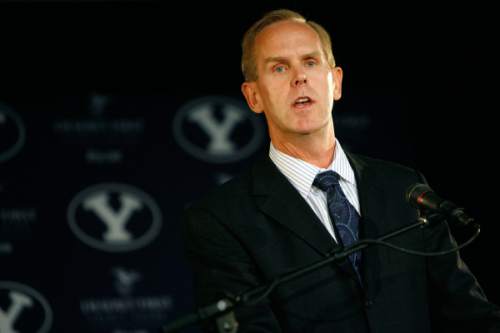This is an archived article that was published on sltrib.com in 2015, and information in the article may be outdated. It is provided only for personal research purposes and may not be reprinted.
Provo • Back in the summer of 2010, after in-state rival Utah received an invitation to join the Pac-12, BYU football coach Bronco Mendenhall proclaimed during late July's Mountain West Conference football media days that the Cougars were "prepared to go it alone, if that is what it comes down to" in order to remain a top-25 program in the shifting college football landscape.
Few realized it at the time, but the coach was hinting at something that occurred a month later: BYU announced on Aug. 31, 2010, that it would become a football independent and leave the relatively safe confines of the MWC, starting with the 2011 season.
"I remember thinking at that time that if there was any school that could pull it off, going alone, it was us," Mendenhall said last week in a one-on-one interview with The Salt Lake Tribune. "I still feel that way, that we can do it and reach some of our goals. But college football has changed. Independence is not sustainable in the long term. I no longer feel that it is a desirable destination for us."
Asked for a timetable regarding how much longer BYU can remain independent and still be competitive against a future schedule laden with teams from so-called Power 5 conferences, Mendenhall roughly echoed what Tom Holmoe told reporters in February when the Cougars' athletic director of 10 years said BYU needs to be in a Power 5 conference "sometime in the near future."
When pressed, Mendenhall said he hated to be pinned down, but then came up with "about" three years. "Anything longer than that would be really, really hard," he said.
BYU has gone 34-18 in four seasons as an independent, including 9-10 against Power 5 programs and Notre Dame — a defacto Power 5 school. It will play 10 Power 5 opponents — 12 if you want to include Boise State — in the next two seasons. The 2016 slate still needs two more games.
Why are Holmoe and Mendenhall suddenly now sounding the warning alarms — notwithstanding last summer's plea from Mendenhall to a Texas newspaper for an invite from the Big 12?
It's simple. As is almost always the case, it is about money.
Mendenhall said revenue from television contracts will bring each Power 5 school between $20 million and $27 million per year. Most experts put the number around $25 million.
"That's a whole lot more than we get from our deal with ESPN," said Mendenhall, referring to a contract that pays BYU an estimated $10 million per year, give or take a million, through 2018.
Beginning Sept. 1, BYU will join most Power 5 schools in paying its scholarship student-athletes a cost-of-attendance stipend. Mendenhall said BYU will pay out more, per scholarship athlete, than most schools in the country, but wouldn't divulge that figure. Holmoe acknowledged last August that BYU will provide its scholarship athletes with everything that the Power 5 schools will.
"It is real," Holmoe said of the growing revenue disparity between college football's haves and have-nots. "So to try to compete in every aspect at that level, without having that [financial] support, is hard. I don't think we can do it indefinitely. We are trying to come up with new ideas, new ways, to stay fiscally competitive. And that is something that we work on every day."
What about returning to the non-Power 5 Mountain West?
Mendenhall shudders at the thought, saying it is "not an option" that BYU is exploring. That route wouldn't solve the revenue disparity with the Power 5 schools, but it would give the Cougars a slightly better November schedule and better access to the lucrative College Football Playoff and/or a New Year's Six bowl game.
Holmoe seems more open to the idea than Mendenhall, whose contract takes him through 2016.
"I am going to just be open with you and say that's some advice we get from our fan base, a segment of it," Holmoe said in February. "So that would be something that would be a possibility down the road. [The MWC] might be interested, and there have been other [non-Power 5] conferences that have expressed interest. … There are some people, our fans, even good friends of mine that are boosters and donors, and huge supporters, who look at that as a possible landing spot at some point in time. But that's not my focus right now."
One popular misconception is that all BYU has to do is win more big games, or go undefeated, to get a Power 5 invite. There's a lot more to it — as Boise State has learned.
Mostly, a Power 5 conference needs to be willing to expand, and prospects of that happening don't appear imminent, especially with the NCAA move recently toward deregulating conference championship games. The Big 12, Mendenhall's dream conference, is the only Power 5 conference without a football championship game.
However, Mendenhall still believes winning is a critical part of the puzzle.
BYU's 2015 and 2016 schedules include Nebraska, UCLA, Michigan, Missouri, Utah, UCLA, West Virginia, Michigan State and Mississippi State. The BYU coach calls it a "new era of independence for the program, with each game providing an opportunity for BYU to make its case.
"Playing our way in may be what it takes," he said.
Mendenhall also says he's willing to do whatever it takes to make the school's bid for Power 5 inclusion a success.
"I am passionate about pursuing that inclusion," he said. "It is going to require more from everybody — not only me personally and staff-wise and player-wise, but support-wise in terms of number of people to help. The stakes continue to get higher in every single area."
And time may be running short.
Twitter: @drewjay —
BYU: The independent years
Year Record Bowl/Result
2014 8-5 Lost to Memphis, 55-48 (OT), in Miami Beach Bowl
2013 8-5 Lost to Washington, 31-16, in Fight Hunger Bowl
2012 8-5 Beat San Diego State, 23-6, in Poinsettia Bowl
2011 10-3 Beat Tulsa, 24-21, in Armed Forces Bowl
Overall 34-18 2-2 in bowl games as an independent —
Long-term legacy
Most wins in college football, past 40 seasons (1975-2014):
Team Record Pct.
Nebraska 389-113-2 .773
Ohio State 366-111-7 .763
Florida State 365-116-4 .756
Oklahoma 365-123-6 .744
BYU 354-149-2 .703
Michigan 348-136-7 .715


